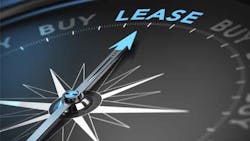Tax-Exempt Financing Solutions You May Not Know About
Many manufacturers are seeking ways to update their equipment to reach the next level in production, sales and profitability, but the need for a large outlay of cash to cover the cost often blocks their progress. Although access to capital is one of the major deterrents to a manufacturing resurgence in the United States, tax exempt financing is a powerful and versatile tool that can provide a lower cost of financing, among other benefits.
Manufacturers’ intention to acquire new equipment and replace outdated machinery is apparent in recent economic data. In Q2 2014, 52% of U.S. industrial manufacturers surveyed planned major new investments of capital during the next 12 months, up from 39% in Q1 2014 and up from 40% in Q2 2013, according to the July 2014 PwC Manufacturing Barometer Business Outlook Report.
Other indicators point to pent-up demand. According to a recent economic outlook from the Equipment Leasing & Finance Foundation:
- Investment in materials handling equipment increased at a 1.8% annualized rate in Q1 2014, and in July 2014 was up 6.8% year over year.
- Investment in all other industrial equipment rebounded at a 20.5% annualized rate in Q1 2014, and in July 2014 was up 5.3% year over year.
- All other industrial equipment investment will likely see moderate growth from Q3 to Q4 2014 as the reshoring of manufacturing continues to be a dominant economic story for the year.
Tax-exempt financing is one way to address these needs.
Understanding the Tax-Exempt Lease Purchase
The tax-exempt lease is available to manufacturers, generally those with $20 million to $200 million in revenue. It is fundamentally a structure that allows the lessee to receive a tax-exempt rate on its financing terms. As one example, consider that a manufacturer who is buying equipment with a $5 million traditional lease might find the tax-exempt rate to be as much as 2% lower.
In a three-way agreement, the tax-exempt lease purchase has the leasing company lease the equipment to the government entity, which then subleases the equipment to the manufacturer on a tax-exempt basis. For tax purposes, the manufacturer owns the equipment and has clear title to it at the end of the lease.
Manufacturers like these financing arrangements because they make it possible to acquire new equipment at a lower cost, and local governments like the transactions for economic development reasons. For the manufacturer, there are other benefits in addition to the cost savings. For example, with a government issuer involved, the manufacturer’s repayment period is typically longer, often 10 years instead of 5-7 years, which makes payments lower.
Manufacturers should use these criteria to determine if they qualify for a tax-exempt lease purchase:
- The manufacturer needs to acquire new equipment versus used.
- The project needs to provide economic benefit such as job creation or retention and be approved by the local industrial development authority.
- The IRS limits tax-exempt financing to $10 million per site, with a $40 million nationwide limit per company, including affiliates.
- A manufacturer’s capital expenditures must not exceed $20 million, including the tax-exempt financing, for a period of three years prior to the tax-exempt financing’s closing and three years forward from that date.
- The IRS restricts tax-exempt financing for non-core production costs, land and building retrofit/refurbishment costs.
How to Select a Tax-Exempt Financing Partner
Manufacturers interested in tax-exempt equipment financing should seek guidance from a trusted equipment finance provider. With the right partner, the process doesn’t need to be complicated or intimidating. In fact, manufacturers should look for equipment financing partners who can accommodate them with customized payments to match budgets and a project’s useful life.
First, make sure the finance company:
- understands your company’s needs.
- has a streamlined credit application approval process.
- is stable and able to offer expert guidance through economic ups and downs.
- has experience in manufacturing equipment financing and tax-exempt financing structures.
Next, make sure the financing partner will take the time to ask questions and to listen as you work together through the process.
Finally, in the acquisition of equipment, it’s important that manufacturers consider all available tools. After all, the value of manufacturing equipment comes from using it, not from owning it.
Always consult with a tax advisor before making equipment-purchasing decisions.
Peter K. Bullen is senior vice president – bank channel for Key Equipment Finance.
